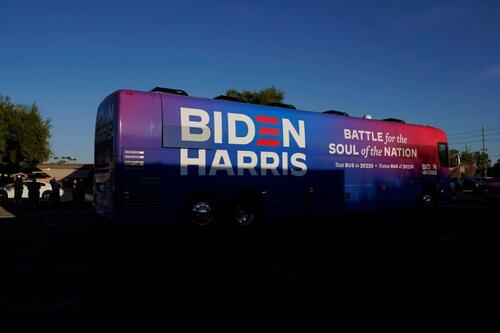Jury Clears Most Defendants In ‘Trump Train’ Case
A federal jury in Texas on Sept. 23 rejected voter intimidation allegations against nearly all of the President Donald Trump supporters who surrounded a Biden–Harris campaign bus on a highway days before the 2020 election.
The campaign bus was traveling to Austin for an event when vehicles with Trump flags allegedly boxed it in.
Six Trump supporters were sued by people on board the bus, including former Texas Democrat lawmaker Wendy Davis, alleging violations of the Ku Klux Klan Act and other laws.
But now, as The Epoch Times’ Zachary Stieber reports, jurors cleared five of the six defendants.
The jury found Texas man Eliazar Cisneros responsible after his car brushed against another vehicle as the caravan of vehicles, dubbed the “Trump Train,” traveled down Interstate 35 from San Antonio to Austin on Oct. 30, 2020.
Cisneros was ordered to pay the bus driver $10,000 in damages and an additional $30,000 in punitive damages.
“Today’s victory sends a strong message that in our democracy every individual has the right to express their support for a political candidate without the fear that they will be threatened for doing so,” David Gins, one of the plaintiffs and a former staffer with the Biden–Harris campaign, said in a statement.
Tim Holloway, the Biden–Harris campaign bus driver, said that he hopes the verdict “discourages people from doing things in the name of politics that endanger lives.”
Joeylynn Mesaros, one of the defendants who was cleared, said defendants were “just ready to feel like normal people again.”
Randi Ceh, Steven Ceh, Robert Mesaros, and Dolores Park were the other defendants found not liable.
An attorney for Cisneros said his team would appeal.
“With regard to my client, it’s not over yet,” attorney Francisco Canseco said.
Video footage recorded by Davis showed Cisneros hitting a campaign volunteer’s car, resulting in traffic slowing to a crawl.
People on board the bus, which was not hit, called 911 and asked for a police escort, but no escort came. The FBI investigated the situation. Prosecutors brought no criminal charges.
The Ku Klux Klan Act has rarely been invoked in recent years. It was enacted in 1871.
U.S. District Judge Robert Pitman, who oversaw the case, had previously said that the defendants’ alleged conduct was “similar to a type of political violence that the Klan engaged in at the time of the act’s enactment.” If jurors found that the defendants violated the law, it would overcome defense arguments that the defendants were protected by the U.S. Constitution’s First Amendment, he added.
Tyler Durden
Tue, 09/24/2024 – 13:25

